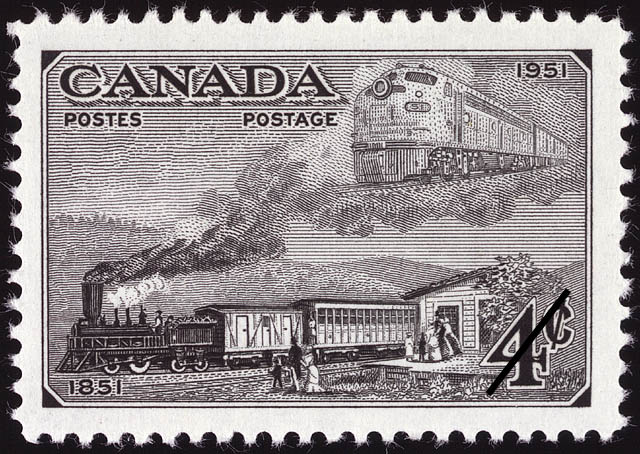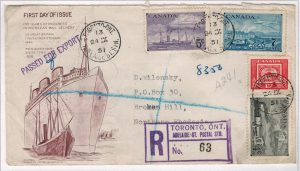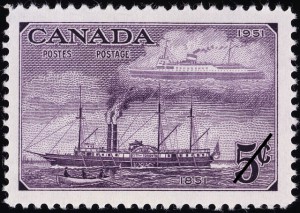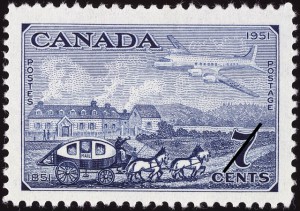On today’s date in 1951, Canada’s Post Office Department (now Canada Post) issued four stamps (Scott #311-314) celebrating the 100th anniversary of the transfer of postal services from Great Britain to British North America.
The three lower denominations (SC #311-313) emphasize the development of communications by land, water and air, each of which was closely related to the development of postal services in Canada. The set’s fourth stamp (SC #314) features the Province of Canada’s first stamp, the three-pence beaver (SC #1), issued in 1851.
The stamps’ first day of issue coincided with CAPEX, the “Canadian Philatelic Exhibition,” an international stamp show held in Toronto. Each of the four stamps was printed by the Canadian Bank Note Company and designed by Herman Herbert Schwartz.
CAPEX 51 was the first of four Canadian international shows to be held before the turn of the century, with others following in 1978, 1987 and 1996.
Canada’s fifth international show, CAPEX 22, is slated for next June 9-12 in Toronto. To learn more about next year’s CAPEX, CSN published a two-part series last May (in Vol. 45 #3) and June (in Vol. 45 #4).
A first-day cover mailed from Toronto to Rhodesia (present-day Zimbabwe) is franked with all four stamps issued in conjunction with CAPEX 51. Photo by Andrew Liptak, also known as ‘Philcovex’ on his Postal History Corner blog, now managed by the Postal History Society of Canada.
THE CANADIAN PHILATELIC EXHIBITION
CAPEX has a storied history dating back 70 years to the mid-20th century.
Canada took its first steps onto the international stage in 1951, kicking off a decade-long philatelic boom in this country and abroad. While “Organized Philately” has even deeper roots, stretching back to at least 1887 with the founding of the Canadian Philatelic Society (not a predecessor to today’s Royal Philatelic Society of Canada, which was founded in 1919 as the Winnipeg Stamp Society), CAPEX 51 was a watershed moment for the hobby. The show celebrated the centennial of the Province of Canada gaining postal independence from Britain plus the issue of its first stamp – the 1851 three-pence “Beaver” – but it also set the stage for wider interest in contemporary Canadian stamps issued through the 20th century.
After Canada’s first international philatelic exhibition, it would be another 27 years before its second one, CAPEX 78, which was followed by the country’s third world show, CAPEX 87, just 11 years later. Only nine years separated the latter event from Canada’s fourth international exhibition, CAPEX 96, which marked the country’s latest step onto the international stage.
“No one could realistically expect that Canada would continue hosting world shows at ever-decreasing timespans as in the past,” wrote Tony Shaman, then the editor of the Royal Philatelic Society of Canada’s (RPSC) Canadian Philatelist, in 2007. “Indeed, more than 10 years have already passed since our last world extravaganza, CAPEX 96. Since that time, for a variety of reasons, many individuals have predicted that the 1996 philatelic bash would be the last international that Canada would host.”
Despite the uncertainty, with Shaman questioning 14 years ago whether there was “a will to carry on a proud tradition begun with CAPEX 51,” today’s philatelic leaders have been working since 2018 to plan CAPEX 22. Coming to Toronto next June – and in the same venue as the previous two shows – the upcoming CAPEX will be Canada’s fifth international show (and the first in 26 years). It will also be just the fourth North American international exhibition since 1996 (after Pacifica 97, Washington 2006 and New York 2016).
TRAINS, SHIPS & STAGECOACH
The four-cent stamp (SC #311) displays trains from 1851 and 1951.
The lower portion features an old-fashioned wood-burning steam-engine and train while the modern train in the upper half of the stamp is a composite picture of two Canadian units—the first streamlined diesel-electric locomotive manufactured in Canada at the Montreal Locomotive Works in April 1950, and a train in regular passenger service in 1951 on the Canadian Pacific Railway between Montreal and Vermont.
The five-cent stamp (SC #312) displays the City of Toronto, a side-paddle-wheel steamship, based on an original drawing by G. A. Cuthbertson. The ship, built in present-day Niagara-on-the-Lake, Ont., sailed from Lake Ontario to Prescott on the St. Lawrence River. In the upper half of this stamp is a reproduction of the Canadian National Steamship, Prince George, which was built in Victoria, B.C. and operated at the time of issue from Vancouver to Alaska.
The seven-cent stamp (SC #313) depicts a stagecoach passing Jordan’s York Hotel on King Street East in present-day Toronto. In 1814, the legislature met in this hotel after invading U.S. forces destroyed the government buildings the previous year. The stamp’s upper half features a 1951-type Canadian-built North Star plane in the service of Trans-Canada Airlines.
‘BEAVER’ REPRODUCTION
The 15-cent stamp (SC #314) is a reproduction of the 1851 three-pence beaver stamp designed by Sir Sandford Fleming.
It was the first 15-cent denomination issued in Canada since 1908; officials believed it would be convenient for customers who wished to pre-pay the postage on airmail letters to Europe.





